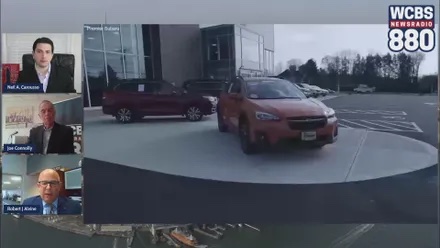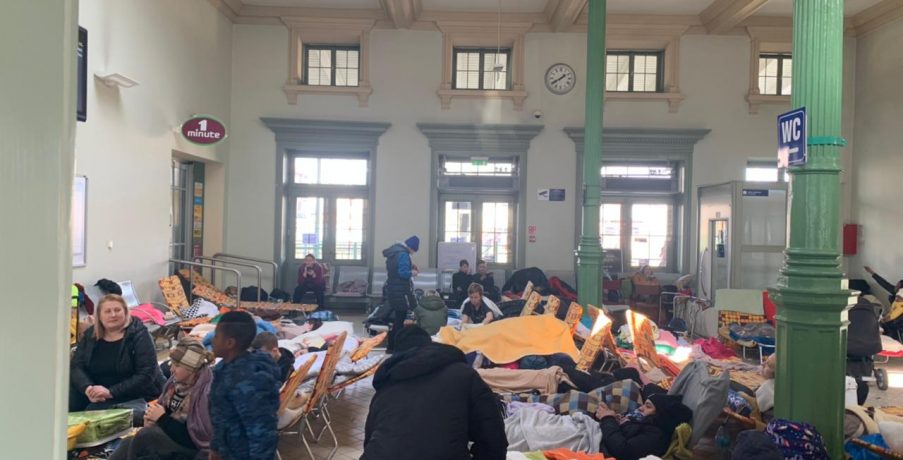
-
Car Dealerships Find New Revenue Streams Amid Supply Chain Crunch
Post Views: 389By Joe Connolly and Neil A. Carousso
BRANFORD, Conn. (WCBS 880) — The automotive industry has been facing some of the worst lingering economic impacts from the COVID-19 pandemic. It has forced manufacturing plants and dealerships to make adjustments to its processes in order to serve customers.
A pandemic pivot two years ago at Premier Automotive Group in Branford, CT became an entirely new business model that has optimized the customer experience.
“We came up with a digital model and and quite frankly, it was a model that we had for several years that customers didn’t really use a lot and that’s where they could take the process and buy the entire car online,” said Premier Automotive Group president Robert Alvine on the WCBS Small Business Spotlight, sponsored by Dime Community Bank.
He said 20 percent of their customers now buy and lease cars fully online then Premier delivers it to their home or office.
“We realized that customers kind of liked the process and whether they like the entire process or part of the process, we wanted to keep that digital process in place,” he said. “We at least can tell a customer that we’re going to sell you the car the way that you want to buy it.”
It’s that high-level of customer service that has kept Alvine in business for more than 21 years. He started his career in commercial banking where he saw first-hand the strong relationships between bank managers and their customers. That’s a key element Alvine has implemented at his dealerships.
“We have really tried hard to make sure that we have an authentic experience and a transparent experience for everyone,” he said.
The biggest challenge for car dealerships and their customers are the ongoing supply chain issues. There are fewer cars on the lot than usual, meaning it could take months for someone to get the make and model they want.
“I think there’s going to be an amazing forensic on this entire thing in the supply chain and materials because we’re seeing the complete downfall of the just-in-time inventory processes in manufacturing plants,” said Alvine, continuing, “When the raw materials aren’t available just-in-time, there’s no stock piles with them. And I think some last year, if you look at some of the car companies that made some good gains, they’re ones that might have had some stockpiles of parts.”
He notes car dealerships are “hoarding” the supply of new vehicles that they have on their lots rather than trading with other dealerships as they would pre-pandemic.
“Used cars are rising in price because there (are) more used cars available than there are new cars available,” Alvine said, adding that used cars appreciated 30 percent in value last year. That’s highly unusual for a depreciating asset.
Because people are keeping their cars longer, there’s greater demand for automotive parts to improve used car performance. Premier Subaru in Branford began selling parts online in 2007 under a different branding. Fifteen years later, that adjacent service helped the group survive the pandemic.
“That’s like a supplemental line, if you will and we sell parts, believe it or not, all over the globe,” said Alvine.
Premier keeps its parts inventory in-house.
See more on the solutions car dealerships and manufacturers are coming up with to combat pandemic pressures on the Small Business Spotlight video above.
-
Small Business Comeback Tour: Cougar Headquarters
Post Views: 489By Joe Connolly and Neil A. Carousso
CRANFORD, NJ (WCBS 880) — This local business is lifting the spirits of communities across New Jersey.
Donna Marino, the owner of Cranford-based Cougar Headquarters, is elated to once again be fielding inquiries from schools and community organizations for spiritwear and youth sports uniforms across New Jersey as COVID-19 cases ease and her business rebounds.
“We’re in more and more areas and hearing from more and more schools,” she said on the WCBS Small Business Comeback Tour, sponsored by PSE&G.
“We’re reaching much further areas in the varsity jacket business. We’re in Irvington, Jersey City, we’re going much further than the Union County area.”
Cougar Headquarters also prints lawn signs and does screen printing, which started out as an e-commerce business before the store in Cranford became available.
“I was in the men’s formalwear business for 17 years and I was in the garment business really my whole life until this opportunity presented itself,” Marino said.
The small business also creates fundraising websites for schools and non-profit organizations – a service that helped supplement their revenue loss when they were shut down. At the height of the pandemic, Cougar Headquarters created a Cranford Strong t-shirt fundraiser and raised more than $5,000 for the local food bank Cranford Family Care.
Watch the Small Business Comeback Tour video for more about Cougar Headquarters above.
-
What’s Up New York Exclusive on Broadway
Post Views: 475Produced by Carousso Enterprises, LLC and NY2C Corp.
NEW YORK, NY — Here are the must-see new Broadway shows this spring season.
This week, NY2C’s What’s Up New York gets an exclusive behind-the-scenes look at one of Broadway’s hottest new musicals: Noble Family.
NY2C’s flagship digital series “What’s Up New York” is produced and written by Carousso Enterprises, LLC.
-
Masks are off at NYC gyms, but pandemic habits are hard to break
Post Views: 379By Joe Connolly and Neil A. Carousso
NEW YORK (WCBS 880) — This is the first week that mask and COVID-19 vaccine requirements at fitness gyms in New York City have been lifted, bringing a sigh of relief to many as the world marks two years since the pandemic started. Despite the loosening of COVID-19 restrictions, not everyone is eager to return to the gym.
Capacities at SLT fitness studios remain sluggish in Manhattan, which founder and CEO Amanda Freeman believes is partly due to remote work.
“Our suburbs have recovered much better,” Freeman said on the WCBS Small Business Spotlight, sponsored by Dime Community Bank.
SLT has 17 studios open across New York, New Jersey, Connecticut and Massachusetts. They closed nine gyms permanently during the pandemic and pivoted to virtual exercise classes.
“I believe that the future, like most people in the fitness industry believe, is an omnichannel future fitness where you might not get to a studio as many days of the week as you did prior to the pandemic,” said Freeman.
She told WCBS 880 that there are some who only want to workout at home and others who only want to exercise at the gym, but most are enjoying the convenience of a hybrid situation.
“Personally, I don’t love working out at home, but you know that it’s not horrible and sometimes you can’t get to a studio.”
Freeman said they spent the last two years perfecting their at-home and on-demand classes.
“It’s nothing I ever thought I would do, and again, which is why it didn’t exist before the pandemic,” she said. “It was something I felt like we had to do for the future of the business. The rest of our business was contracting so deeply and who knew how it would be post-pandemic.”
She believes there are still opportunities and new categories for SLT to explore in the at-home fitness space. SLT currently offers a monthly subscription to its on-demand exercise videos. They upload new videos every Tuesday morning. Some workouts don’t require equipment and others do, which SLT is now manufacturing and selling.
“Our workout is best described, although I don’t like to say it, but I say it’s either a high-intensity version of Pilates or we say if cardio strength training and Pilates had a baby, it would be SLT.”
SLT is an acronym for strengthen, lengthen, tone.
The biggest hurdle with virtual exercise classes, Freeman said, is replicating the in-person training.
“In a lot of ways it’s form; it’s form correction,” she explained. “How do you bring the detail of the corrections and the detail of the form?”
The fitness studio owner relies on instructors to be charismatic and knowledgeable.
“You need so much to be that, what I call a ‘star-structor,’ and at-home is so much about star-structors, and honestly, SLT has never been about a star-structor business,” said Freeman. “We like hard working, smart, talented instructors. But, the world of fitness has really gone the way of like the cult of personality of fitness. And it had gone that way, then it was a little not that way, and then, when at-home became so big, it was 100 percent that way where one instructor could have 1,000 people doing the same workout.”
See more on the changes in the fitness industry and SLT’s virtual exercise classes on the WCBS Small Business Spotlight video above.
-
INTERVIEW: Refugee who escaped to Poland helps fellow Ukrainians seeking safety
Post Views: 457By Neil A. Carousso
NEW YORK (WCBS 880) — More than 1 million people have fled Ukraine since Russia invaded last week, accounting for 2% of the Ukrainian population.
A refugee who escaped the war and bloodshed in Ukraine is now helping his fellow Ukrainians cross the border into Poland, where they have been welcomed with open arms.
Mykola Golubei escaped Kyiv with his wife last week after waking up in the middle of the night to Russian rocket attacks.
“Suddenly I realized that I could die every moment,” Golubei told WCBS 880. “Each second could be the last second of my life because the rocket could get in the building where I was so I just started catching all the things I could, taking my wife. My mom was in shock. I realized that the war started and my wife said, ‘No, no it’s something, maybe gas, or something.’ And we ran on the subway and I have a WhatsApp chat with three of my close friends and one of them typed in the chat, ‘Hey guys, I just saw the light of the rocket attack.'”
Golubei and his wife went got on a train at a nearby station, without even knowing where it was going, just to escape Kyiv.
He realized halfway through the trip that the train was bound for Poland.
For the first two days, he and his wife were in terrible shock, jumping at every sound, fearing that the war had reached Poland.

A shelter in Poland where Mykola Golubei is staying after fleeing Ukraine. Photo credit Mykola Golubei. By the third day, he started receiving messages from others seeking help to find a car or bus to get out of Ukraine.
Golubei is now in a shelter in Poland, near the Ukrainian border, where he is organizing efforts to help citizens who are seeking refuge. He and a group of at least eight other people started a coordination center for volunteers to assist Ukrainians seeking safety.
“We need food, we need medicine, we need sleeping bags, but first of all we need the war to stop,” he said. “We need a lot of government organizations to help the Ukraine army, but a lot of people just go and help to protect the citizens — they don’t have ammunition, they don’t have the protection on their head, protection on their heart. We don’t ask for rockets, we just ask for something to protect people.”

Inside look of a boarded up bomb shelter in Ukraine. Photo credit Image courtesy of Mykola Golubei. Golubei said he feels guilty that he is safe in Poland and is trying to get others out.
“I feel shame and guilt,” he said. “My wife and me feel the guilt that we are here now and safe and our friends are there and so that’s why we give, all of us, our time and energy and desire to help other people.”
The Russian invasion of Ukraine has upended not only his life, but the lives of all Ukrainians, and now Golubei is solely focused on the other refugees that he is trying to help.
“You know, do you have experience when you have a plan? Plan on vacation? Plan next week? I have a lot of plans and now my plans are just the next right action,” he said. “Last Wednesday, I had a plan with my wife. We went to buy pets, two rats in a zoo shop, it was our plan, and we were thinking which of them we wanted to buy the next day, and the next day the war started and so all of my plans are just ruined. So I try to be as busy as I could all day long, calling somebody, typing, put post, go to the train station, talk to the people.”

Mykola Golubei said his friend sent him this photo of people hunkering down in a bomb shelter in Ukraine. Photo credit Mykola Golubei. Golubei said most of his friends have decided to stay in Kyiv and Kharkiv and are ready to die for Ukraine.
He is heartbroken by the images he is receiving from friends and family of bomb shelters that have been set up in the place where he calls home.
“I have just one question — why?” Golubei said. “I couldn’t explain myself why Vladimir Putin started doing this because if he had all the power in the world he could build a university, he could start an educational program, he could do everything with the money that he’s got. Why did he start the war? I don’t understand.”
There are several organizations that are collecting donations for Ukraine relief efforts including the Ukrainian Red Cross and the International Rescue Committee, the United Nations World Food Programme, Doctors Without Borders among others.
Interview
Social Feeds

VIDEO: Told the airline to book us on the next flight out (SPONTANEOUS TRIP!)

VIDEO: The Taylor Swift Effect | WCBS Business Breakfast

VIDEO: Future of NYC | WCBS Business Breakfast

VIDEO: Reasons for New Yorkers to be Optimistic | WCBS Business Breakfast

VIDEO: NYC's AI Chatbot | WCBS Business Breakfast






